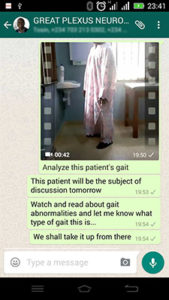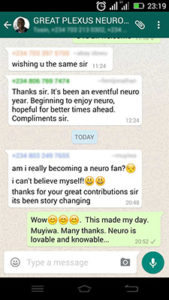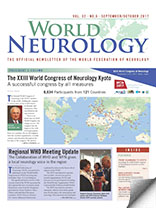By Philip B. Adebayo and
Funmilola T. Taiwo
Neurophobia has been widely described by medical students1 as a fearful perception of neurology and neurological sciences. A survey among medical students in three Nigerian medical schools has indicated factors for neurophobia such as difficulty in understanding neuroanatomy, lack of teaching aids/models, and poor teaching of neurosciences subjects.2
In contrast to persisting manpower deficits in Nigeria, neurological disorders are on the rise. Therefore, there is a need to increase the neurological workforce. This would be difficult if neurophobia is highly prevalent. A number of strategies to address neurophobia, including practicable, stimulating, and novel teaching methods, are indicated.

Figure 1
Our approach to ameliorate neurophobia in the past was to support additional bedside tutorials and improved usage of online resources. Those initiatives aimed at increasing small group discussions among students. Small group sessions are active models of learning. The main advantage is the student-centered approach, which also helps students develop the ability for self‑assessment.3 Small group learning sessions have been found to make students more active in the learning process while building their competence in information seeking.3
In September 2015, final-year medical students of Ladoke Akintola University of Technology in Ogbomoşo, Nigeria, were engaged in a group discussion via an online chat platform (Whatsapp) with the neurology lecturer and the class representatives as the group administrators. The student representative added interested members of the class to the chat group while the lecturer posted tutorial questions to the platform twice weekly. The tutorial questions (case vignettes) were posted for discussion and included topography, neuroimaging, case videos, EEG charts, and laboratory results. (See Figure 1.) Students were encouraged to make contributions regarding the case in focus. The neurology lecturer, Philip B. Adebayo, moderated the chat to ensure it remained strictly academic. We also posted web links for additional readings with regard to the case in focus.

Figure 2
In December 2015, we sought feedback from the students to ascertain the level of interest and whether the platform helped reduce their fear of neurology. The responses were gathered in a non-structured qualitative manner. One student said, “It has been an eventful neuro year. I’m beginning to enjoy neurology.” A second student replied, “Am I really becoming a neuro fan? I can’t believe myself.” (See Figure 2.)
The chat platform seems to be having an effect on increasing interest in neurology. Small group learning sessions have been found to enhance learning, and Sharan et al4 attributed this to cooperative learning kinetics.
Even though our observations are anecdotal, we propose a welcoming hybrid model (teacher-driven, online, and social media small group discussions in a team-based problem-solving paradigm).
Our strategy is not new, but it underscores the importance of a multifaceted approach, synonymous with multidrug therapy in fighting neurophobia. Different approaches may be employed within a single platform. Although a well-designed randomized study may better evaluate the overall benefit of employing Whatsapp in fighting neurophobia, we think that this approach will increase interest in neurology, which is the first step in conquering neurophobia. We suggest the use of e-learning methods adopting common platforms like Whatsapp to augment traditional method of teaching neurology. •
References
- Jozefowicz RF: Neurophobia: The fear of neurology among medical student. Arch Neurol 1994, 51:328-9.
- Sanya EO, Ayodele OE, Olanrewaju TO. Interest in neurology during medical clerkship in three Nigerian medical schools. BMC Med Educ 2010 May 20;10:36.doi:10.1186/1472-6920-10-36
- Biswas SS, Jain V, Agrawal V, Bindra M. small group learning: effect on item analysis and accuracy of self-assessment of medical students. Educ Health (Abingdon).2015; 1:16-21
- Sharan S. Cooperative Learning in Small Groups: Recent Methods and Effects on Achievement, Attitudes, and Ethnic Relations. Rev Educ Res 1980; 50: 241‑71.
Philip B. Adebay is from the Neurology Unit of the Department of Medicine at Ladoke Akintola University of Technology and Teaching Hospital in Ogbomoşo, Nigeria. Funmilola T. Taiwo is from the Neurology Unit of the Department of Medicine at Benjamin Carson Sr. School of Medicine at Babcock University in Ilishan-Remo, Nigeria.
